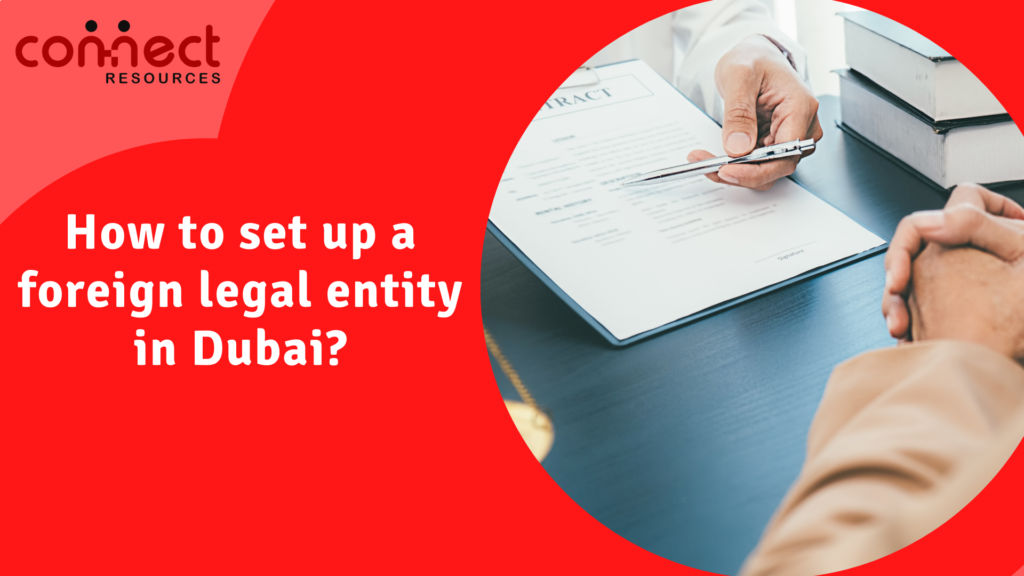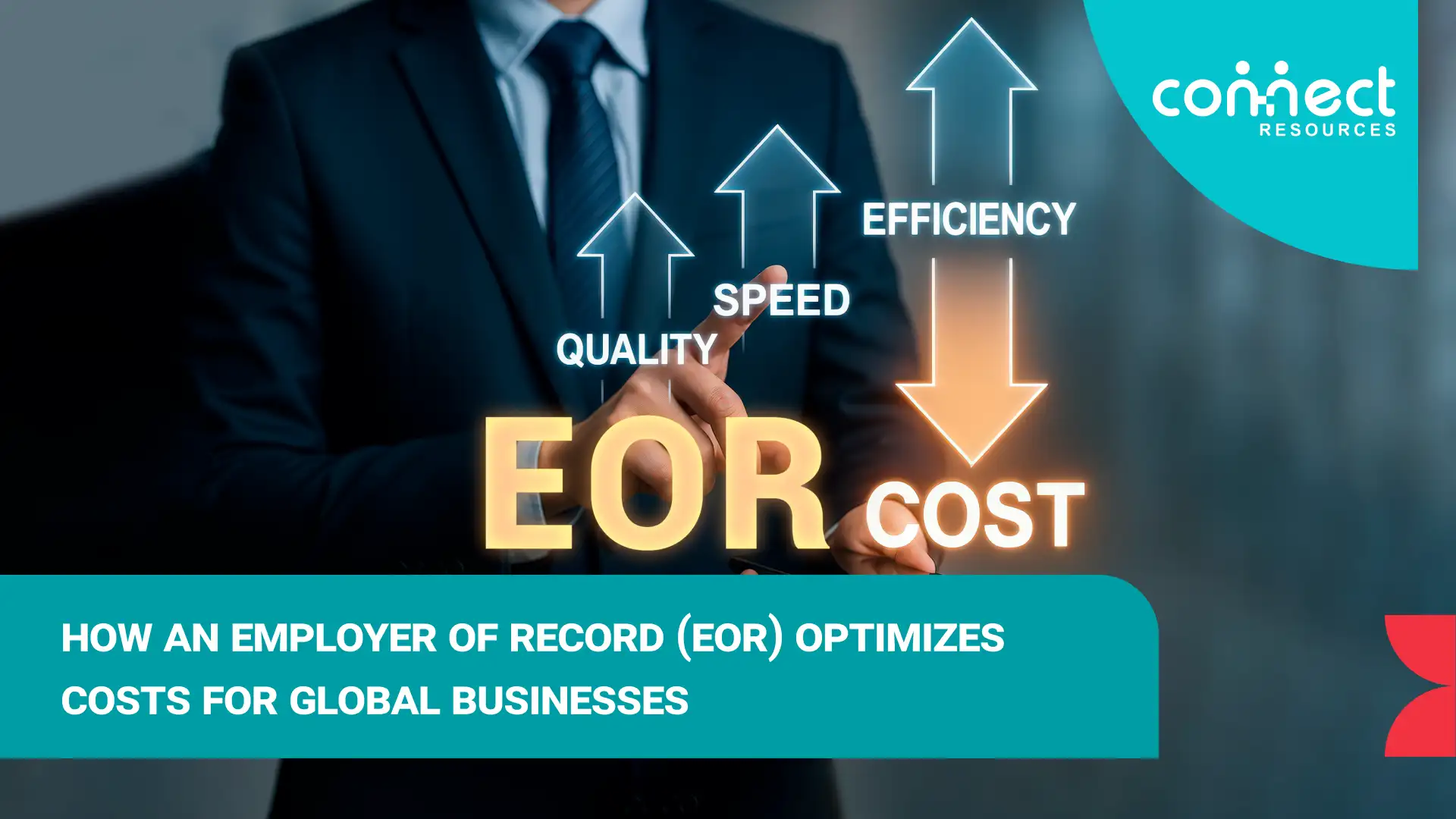You may have a company that is doing well right now. This company has been growing beyond expectations, and statistics show that it’ll continue to do so. As a business owner, it’s inevitable to wonder what the process to set up a foreign legal entity would be like.
In this article, you’ll learn everything about how much money and time you need to set up a foreign legal entity in Dubai. You’ll know the kinds of legal entities and economic zones. There’s a process that you must follow to establish a successful business in the country. Let’s observe:
- What is a foreign legal entity?
- Branch offices vs. subsidiary ones.
- What economic zone should you choose?
- Types of licenses you can get.
- Steps to set up a foreign legal entity in a free zone.
- How much do you need to set a foreign legal entity?
- How can Connect Resources help you?
1. What is a foreign legal entity?
It’s very common for successful companies to need more space in their headquarters. Owners may opt to open another branch in their city or even in the country. But what if the company needs to open an office outside the country? In that case, it’d be an international entity.
Moreover, here you can learn more about the process of hiring an international contractor.
It’s also known as a foreign legal entity. Basically, it’s a foreign arm of a domestic firm formed when the company wishes to expand into a new country. There’re several methods for establishing an international corporation, but the final aim is always the same: to promote worldwide expansion.
2. Branch offices vs. subsidiary ones.
A branch office is an expansion of an established company and isn’t a separate legal entity from the parent company. Furthermore, branch offices are permitted to carry out the same commercial operations as their parent firm in the UAE.
If you want to know more about how you can solve your HR needs, click here.
By contrast, a subsidiary company is regarded as a legal entity distinct from the parent company. According to their trade license in the UAE, the subsidiary business is permitted to engage in any desired operations.
3. What economic zone should you choose?
The UAE offers business owners some options for attracting them to set up a foreign legal entity in the country. As a result, there’re areas called “free zones,” and this is where you can establish your company, with great benefits. Let’s observe:
3.1. Free zone (FZ)
If you’re the kind of owner who prefers to have total control over their business, free zones are for you. The Dubai government developed the free zone idea to entice international investors to set up a foreign legal entity in the city.
Basically, it’s a special economic zone in which business owners may enjoy multiple ownership opportunities and 0% tax incentives. Nevertheless, there’re disadvantages to establishing a business in an FZ. One of the main ones is that you’re not authorized to do business directly with the UAE’s domestic market.
Nowadays, there are around 30 free zones in operation in Dubai. In general, each free zone is built around an industrial area and gives licenses to businesses in that field. Here are some examples:
3.1.1. Dubai International Financial Centre (DIFC)
The DIFC is a financial center that draws a variety of financial service providers. It also attracts insurance and legal service providers. Of all the free zones in the UAE, the DIFC has the particularity of having its own legislative system.
As a result, the DIFC’s commercial rules and regulations are largely based on English Common Law principles. Furthermore, the DIFC has an autonomous court system in charge of the administration and enforcement of justice in the DIFC.
Additionally, parties established outside the DIFC may elect to have their commercial contractual relationships governed by DIFC law. They may also elect the DIFC courts, arbitration, or mediation under the rules of the DIFC-LCIA Arbitration Center.
Besides, they have exclusive jurisdiction over all civil and commercial disputes arising within the DIFC.
3.1.2. Dubai Multi Commodities Centre (DMCC)
The Dubai Multi Commodities Centre (DMCC) is a government institution formed in 2002 to improve commodity trade flows via Dubai. As a Dubai government authority, they’re committed to developing Dubai as the worldwide gateway to the Middle East for trade.
In this case, DMCC offers a wide range of commodities. It also allows its members to flourish through continual innovation in business services and infrastructure.
3.1.3. Dubai Internet City (DIC)
DIC is housed within an FZ that offers a knowledge-based economic environment. It’s geared towards fostering the growth of information and communications technology (ICT) businesses. Plus, it has the most extensive ICT infrastructure in the Middle East.
Moreover, it enables businesses to access additional financing, partnerships, and cooperative initiatives. Dubai Internet City (DIC) is a technology, education, new media, and scientific innovation cluster.
3.2. Offshore
Offshore firms are also registered in a free zone and benefit from many of the same advantages. However, it’s not a replacement for an FZ corporation. The fundamental distinction between a free zone company and an offshore company is how the firm is managed.
Additionally, if you’re wondering how much it costs to have an employee in your company, click here.
Offshore firms can conduct business only outside of the UAE. They also have no restrictions on the minimum amount of capital they must raise before establishment. However, despite trading in a free zone, a sponsor is necessary, limiting your foreign ownership to 49 percent.
4. Types of licenses you can get.
Aside from settling on a zone, you’ll also need to choose the sort of license necessary. The Department of Economic Development (DED) is responsible for providing licenses, and you can apply for three different types:
- License for commercial use. You need a commercial license to start a business in Dubai that involves trade or the purchasing and selling of products. This license applies to firms involved in import and export, sales, logistics, travel and tourism, general shops, and real estate.
- Industrial permit. This’s for enterprises that participate in manufacturing operations that manually or mechanically turn natural materials and resources into finished goods. This license applies to textile production, metal manufacturing, and paper manufacturing.
- Professional certification. Businesses providing services, craftsmen, or laborers receive a professional license. Medical services, beauty salons, and repair services are examples of businesses that apply for this sort of license.
Plus, if you want more information about how to get a recruitment license in Dubai, click here.
5. Steps to set up a foreign legal entity in a free zone.
For clear reasons, FZs are very popular among international entrepreneurs. Starting with the fact that they provide 0% corporation and personal tax and 100% company ownership. Also, there’s 100% repatriation of capital and earnings, and there are no currency limitations.
There’re seven steps you must take to set up a foreign legal entity. Let’s take a look:
5.1. Identify your business activity.
Firstly, you have to determine the type of your endeavor. Then, you can think about getting the proper license. There’re approximately 2,100 business activities to select from. All of which fall into distinct categories within the industrial, commercial, professional, and tourism sectors.
5.2. Select an FZ.
Secondly, there are over 30 free zones in Dubai to select from. The type of your business may influence which FZ you choose to establish yourself in. In general, it makes sense to locate near other firms in the same industry.
5.3. Select a company name.
Thirdly, your business name must adhere to the UAE’s stringent naming regulations. Namely, you can’t use names that contain derogatory language, they’re considered insulting to religion or related to political organizations.
Here you’ll get more information about the most common challenges when you’re recruiting.
Moreover, if you name your firm after a person, you must verify that person is a partner in the company. Besides, initials or abbreviations aren’t allowed. You may save time and work by hiring a professional to assist you in adhering to the standards and getting your name authorized.
5.4. Request for preliminary permission.
Afterwards, you’ll need to apply for preliminary permission to ensure that the Dubai DED has no objections to you beginning a business. So, you can move forward with the licensing process. You can apply online, in person, or through a third party (like through a law firm).
In addition, the paperwork you need to give will vary depending on the type of your firm, but in general, they are:
- Form for business registration and licensing.
- Your passport or identification (a copy).
- A copy of your visa/residence permit.
- The business’s articles of incorporation.
- The project’s feasibility study.
Furthermore, here you can learn more about the NOC in Dubai.
5.5. Establish a company bank account
Here is where you create a corporate bank account after being authorized and receiving all of the relevant documentation. There’re several banks in the UAE, both domestic and foreign. You may opt for HSBC, Citibank, Barclays, Abu Dhabi Commercial Bank, Commercial Bank of Dubai, and several more.
5.6. Choose a place for your office.
All firms in Dubai must have a physical address. To set up a foreign legal entity in an FZ, by contrast, will make it much easier to locate your new office space.
5.7. Apply for final approval for set up a foreign legal entity
Lastly, to submit for final approval, you must prepare some documents. You’ll need to apply for licensing approval from other authorities (in some cases). Once ready, you’ll need to submit:
- Firstly, the initial approval receipt, as well as all previously submitted documents.
- The lease contract is provided by the Real Estate Regulatory Agency (RERA).
- A duly corroborated service agent contract (for civil institutions and companies owned entirely by non-GCC nationals), involving a local service agent in the UAE.
- Approval from other government agencies involved.
- Finally, you must pay for the license using one of the approved payment methods, and your business is ready to go.
If you want to learn more about the necessary permits that you need, click here.
6. How much do you need to set a foreign legal entity?
The UAE has no business or individual income tax, except for foreign banks and energy corporations. The UAE authorities have likewise set no limits on the repatriation of earnings. To get and renew a business license, you must pay an annual fee to the concerned licensing authorities.
If you want to set up a foreign legal entity, you must consider the prices below:
- Branch of a foreign company. For the first year, you’ll need AED 130,190.13 ($35,450). And for the second one, you’ll pay AED 50,680.50 ($13,800).
- Representative office. You’ll pay around AED 96,219.50 ($26,200) for your first year. On the second one, you’ll give a payment of AED 17,995.25 ($4,900).
- Subsidiary company. A total of AED 84,394.05 ($22,980) is what you’ll have to pay for the first year. However, you’ll pay AED 36,174.125 ($9,850) for your second year.
However, the amount of capital you’d need to pay will depend on the FZ you choose. For instance, minimum capital requirements for DMCC-incorporated companies range from AED50,000 (approx. US$13,614) to AED1 million (approx. US $273,000). In contrast, other FZs may require less capital, and some FZs may not have a set capital requirement at all.
Also, you must consider the additional costs of sponsoring and renewing the UAE work and residence permits of the workers. There’s now a 5% import customs duty on most items entering the UAE. In addition, significant tariffs are levied on luxury items such as wine and cigarettes.
7. How can Connect Resources help you with setting up for a foreign legal entity?
If you’re seriously thinking about expanding your business, we can help you get started. Once you get all the legal permits, we can provide you with the great local staff here in Dubai. You’ll have a luxury team that will adapt to the needs of your company.
In addition, if you want to set up a foreign legal entity in Dubai, you’ll need a special visa. Connect Resources can assist you in the process of obtaining your visa. Then, you’ll be able to establish your business in a free zone.
Would you like to Connect Resources to obtain more information on how much money and time you need to set up a foreign legal entity in Dubai? If you have any questions, call us on + 97143316688. You can email us at contact@connectresources.ae, and you’ll talk to one of our representatives who will answer your questions.







